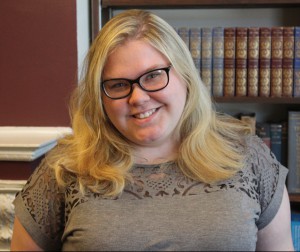Meet the Intern: Amanda Scott

Please welcome the Center for Freethought Equality’s intern for summer 2016, Amanda Scott! The Center for Freethought Equality is a sister organization of the American Humanist Association dedicated to lobbying and political advocacy.
TheHumanist.com: What is your educational and work background?
Amanda Scott: I recently graduated from Faulkner State Community College with an associate’s degree in paralegal studies, and this fall I will be transferring to Georgetown University to major in government. My ultimate goal is to become a public interest lawyer specializing in constitutional and civil rights law. I currently serve as a Youth Advisor for Americans United for Separation of Church and State. Previously I served on the Board of Directors of the ACLU of Alabama, interned with Legal Services Alabama and the South Alabama Center for Fair Housing, and volunteered as a clinic escort at Planned Parenthood Southeast.
TheHumanist.com: How did you first learn about humanism?
Scott: As a teenager I was interested in learning about religious traditions and customs because I wasn’t religious and I wanted to understand my peers who were. I started by reading the sacred books of the Abrahamic religions, then the Eastern religions, and finally made my way to reading the Humanist Manifesto.
TheHumanist.com: Did you grow up in a traditional religious faith? How did it impact you?
Scott: I was raised by a single mother who cared so little about religion she didn’t even bother labeling herself. While growing up, she instilled in me the humanist values of doing good for its own sake and not for the expectation of a divine reward. She led by example when helping people in need without praising a deity.
TheHumanist.com: What interested you most about working for the CFE?
Scott: I was interested in the Freethought Equality Fund PAC dedicated to electing nontheist candidates into public office. I am passionate about increasing the public visibility of nontheists, whether they identify as atheists, agnostics, humanists, or none of the above. I think being open and honest about our nonbelief will help remove the stigma of being a nonbeliever.
TheHumanist.com: What book has influenced you the most?
Scott: There have been so many throughout different periods in my life, but the most recent one has been Alan Dershowitz’s Letters to a Young Lawyer.
TheHumanist.com: If you could have dinner with any three people in the world (living or dead), who would they be and why?
Scott: Supreme Court Justice Hugo L. Black, who was an Alabama native and the author of several landmark cases on the First Amendment’s principle of separation of church and state. I would have loved the chance to meet him and ask him about his journey growing up on a farm in rural Alabama to becoming a member of the nation’s highest court. I would also love to meet all of the trailblazing women on the Supreme Court.
